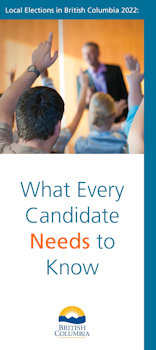General local elections administration
The administration of local elections is a shared responsibility between local governments and Elections BC.
The process and rules for administering general local elections, also largely apply to by-elections to fill vacancies between general local elections, as well as to assent voting events (referendum).
General local elections include elections for:
- Municipal mayors and councillors
- Regional district electoral area directors
- School trustees for boards of education
- Specified parks board commissioners
- Local community commissioners
- Trustees for the Islands Trust
Each municipality and regional district is responsible for administering its own general local election, as well as by-elections and assent voting events.
Local governments may also run school trustee elections on behalf of boards of education. Where a school trustee electoral area falls within the boundary of a single municipality, the municipality must administer the school trustee election.
- Learn more about school trustee elections
- Learn more about being a candidate for local school school trustee
Elections BC administers campaign financing and election advertising rules for general local elections, by-elections and assent voting events in B.C. under the Local Elections Campaign Financing Act. Elections BC also provides education materials and guidance on the application of those rules.
The B.C. government is responsible for maintaining and changing the core local elections legislative framework including the Local Government Act, Vancouver Charter and the Local Election Campaign Financing Act. It also provides education, capacity building, targeted oversight and problem-solving support for participants in local elections.
Election administrators
Local government election officials
Each municipal council and regional district board appoints a Chief Election Officer to ensure general local elections and by-elections are run in accordance with the Local Government Act, Vancouver Charter (in the City of Vancouver), Community Charter, School Act, Offence Act and the local government’s election bylaw.
The Chief Election Officer may be a senior local government employee, such as a corporate officer, or a private contractor hired to conduct the election on the local government’s behalf. The Chief Election Officer is responsible for overseeing all local election administration activities, such as:
- Receiving candidate nomination documents
- Declaring the candidates running for office
- Setting up voting opportunities for qualified electors
- Preparing ballots
- Counting votes on general voting day
- Declaring the election results
The Chief Election Officer is also responsible for training any deputy chief election officers, presiding election officials and any additional election officials needed to conduct the general local election or by-election.
The Chief Election Officer may also work with Elections BC to monitor compliance with campaign financing and election advertising rules, and may assist Elections BC to address incidents of non-compliance.
Chief Election Officers do not investigate alleged election offences or administer penalties. However, they have the authority to enforce election rules, such as challenging a candidate's nomination or a person’s eligibility to vote, and to maintain order at voting places such as prohibiting campaign activity within 100 metres of a voting place during voting proceedings. Election officials also have the authority to challenge an elector's ability to vote on the basis that they are not entitled to vote or that they accepted an inducement to vote.
Alleged election offences committed under the Local Government Act are investigated by the RCMP or local police and it is up to RCMP or local police to make a recommendation to the Crown that it appears that an election offence has been committed and should be prosecuted.
For questions about municipal, regional district or Islands Trust trust area elections please contact the Chief Election Officer for that specific jurisdiction. Local government mailing addresses, telephone numbers, email addresses and websites are available at CivicInfoBC.
Elections BC
Elections BC is the non-partisan and independent Office of the Legislature responsible for the administration of the provincial electoral process in B.C. and the campaign financing and advertising rules for local elections and non-election assent voting events under the Local Elections Campaign Financing Act.
Elections BC also registers elector organizations and third party sponsors, and administers lists of disqualified candidates and third party sponsors that failed to file a campaign financing disclosure statement or that were convicted of providing false or misleading information on a financial disclosure statement.
General local elections process
The B.C. government is responsible for the local government system and the local elections legislative framework that local governments are required to follow under the Local Government Act, Community Charter, School Act, Vancouver Charter and the Local Elections Campaign Financing Act when conducting general local elections and by-elections.
Elections BC administers, investigates and enforces the campaign financing disclosure requirements including expense limits, campaign contribution limits and election advertising rules under the Local Elections Campaign Financing Act. Elections BC also has the authority to conduct investigations of any matter that might contravene the Local Elections Campaign Financing Act and levy administrative monetary penalties for non-compliance with the Local Elections Campaign Financing Act.
Local elections
Guidance and resources
Elections BC
Contact information
Contact us if you have legislative questions about general local elections.
250 387-4020
1 800 663-7867


